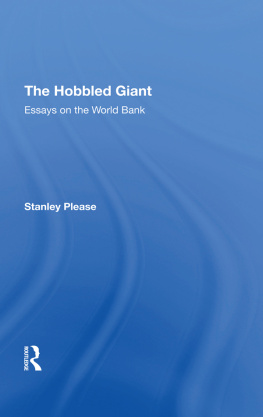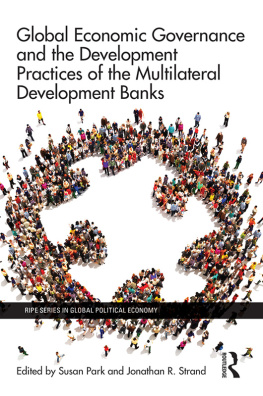The Hobbled Giant
Westview Replica Editions
The concept of Westview Replica Editions is a response to the continuing crisis in academic and informational publishing. Library budgets for books have been severely curtailed. Ever larger portions of general library budgets are being diverted from the purchase of books and used for data banks, computers, micromedia, and other methods of information retrieval. Interlibrary loan structures further reduce the edition sizes required to satisfy the needs of the scholarly community. Economic pressures on the university presses and the few private scholarly publishing companies have severely limited the capacity of the industry to properly serve the academic and research communities. As a result, many manuscripts dealing with important subjects, often representing the highest level of scholarship, are no longer economically viable publishing projectsor, if accepted for publication, are typically subject to lead times ranging from one to three years.
Westview Replica Editions are our practical solution to the problem. We accept a manuscript in camera-ready form, typed according to our specifications, and move it immediately into the production process. As always, the selection criteria include the importance of the subject, the works contribution to scholarship, and its insight, originality of thought, and excellence of exposition. The responsibility for editing and proofreading lies with the author or sponsoring institution. We prepare chapter headings and display pages, file for copyright, and obtain Library of Congress Cataloging in Publication Data. A detailed manual contains simple instructions for preparing the final typescript, and our editorial staff is always available to answer questions.
The end result is a book printed on acid-free paper and bound in sturdy library-quality soft covers. We manufacture these books ourselves using equipment that does not require a lengthy make-ready process and that allows us to publish first editions of 300 to 600 copies and to reprint even smaller quantities as needed. Thus, we can produce Replica Editions quickly and can keep even very specialized books in print as long as there is a demand for them.
About the Book and Author
The Hobbled Giant: Essays on the World Bank
Stanley Please
In these essays, Stanley Please contends that the World Bank is constrained in its ability to use its position and power in the interests of more rapid development of the poorer countries of the world. These constraints derive in large part from the legal restriction on the Bank to engage primarily in project lending and from the division of responsibility between the Bank and its sister institution, the International Monetary Fund (IMF). Although the Banks financing of projects and investment programs has made a significant contribution, Mr. Please argues that greater Bank involvement in national policy formation can greatly benefit economic development. He looks at ways to increase cooperation between the Bank and the IMF, examines the policy work the Bank has done in the past and assesses the capacity of the Bank for policy formation, evaluates the need for it to do more such work, and discusses the likely responses of developing and developed countries to these changes.
Stanley Please, currently a consultant to the World Bank and a research scholar at Nuffield College, Oxford, England, was senior advisor to the operational senior vice-president of the World Bank from 1980 to 1983. Previously, he had been director of the World Bank operational programs in eastern Africa and subsequently, in east Asia.
First published 1984 by Westview Press
Published 1984 by Routledge
52 Vanderbilt Avenue, New York, NY 10017
2 Park Square, Milton Park, Abingdon, Oxon OX14 4RN
Routledge is an imprint of the Taylor & Francis Group, an informa business
Copyright 1984 Taylor & Francis
All rights reserved. No part of this book may be reprinted or reproduced or utilised in any form or by any electronic, mechanical, or other means, now known or hereafter invented, including photocopying and recording, or in any information storage or retrieval system, without permission in writing from the publishers.
Notice:
Product or corporate names may be trademarks or registered trademarks, and are used only for identification and explanation without intent to infringe.
Library of Congress Catalog Card Number: 84-51211
ISBN 13: 978-0-367-29283-6 (hbk)
This book is not intended as a comprehensive and systematic study of the World Bank, Those seeking such a work will find it in publications such as The World Bank since Bretton Woods (1973), by Edward Mason and Robert Asher; a recent study by Robert Ayres, Banking on the Poor: The World Bank and World Poverty (1983); and an earlier monograph by Professor Cairncross, The International Bank for Reconstruction and Development, (1959). This book, on the contrary, comprises a collection of essays which provide an opportunity for the author to reflect on the World Banks role in the world. The essays have been written after the authors twenty years employment in the World Bank in which he has held senior research, policy, and operational positions both as a manager and as an advisor.
Studies written by insiders tend to fall into two categories. There are those which expose the dirty linen of an organization. Authors of such studies typically display neither love nor respect for their previous employer. They might even be waging a personal vendetta for reasons relating to their past treatment or perceived treatment by the organization. At the other end of the spectrum are those who might see themselves as an extension of the public relations arm of the organization for which they previously worked but with the greater credibility which might be thought to come from their no longer being an employee. These authors are likely to present a somewhat romanticized view of the institution.
The author of these essays is bound to be assigned by different readers to one of these two categories. Hopefully, readers will resist such a categorization at least until the whole series of essays is read. The author sees himself as having had, and continuing to have, a very positive disposition towards the World Bank, and from revealed behaviour, this disposition appears to be reciprocated by World Bank management and staff. At the same time any suggestion that the author might be an apologist or might be undertaking a public relations job for the World Bank would highly amuse ex-colleagues by whom the author has always been seen as a rebel against any benign acceptance of what the Bank was doing as representing an optimum pattern of its activities. Despite this appeal for a fair trial, objectivity cannot be assured after employment for twenty years. Apologies are, therefore, required for the many likely slippages from objectivity which paragons of greater virtue and ability would have avoided.
The primary audiences to whom the essays are addressed are those concerned with policymaking for the developing world both in developing countries themselves and in the developed countries. It is, of course, particularly addressed to those responsible for determining the future role and pattern of activities of the World-Bank. In addition to politicians and technocrats in national, regional, and international organizations, the audience is intended to include academics, the media, and others who contribute to the formulation of policy. While, therefore, it is hoped that the book will have an interest to students and the general public, who are less directly concerned with policymaking, it is not a substitute for these readers to the more systematic and comprehensive studies already referred to.



